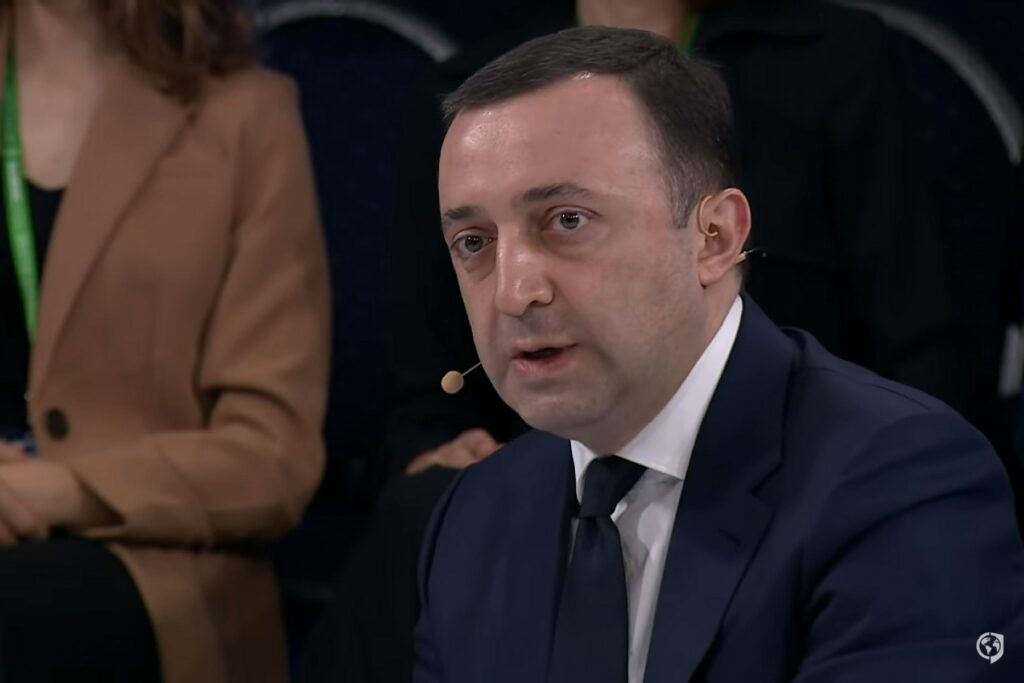Georgia’s Prime Minister Irakli Gharibashvili has drawn sharp criticism both within and outside Georgia for his comments at an international security conference, particularly statements relating to Russia’s war in Ukraine.
Speaking at an event taking place as part of this year’s Global Security Forum in Bratislava, an annual event organised by the GLOBSEC thinktank, Gharibashvili answered questions addressing Georgian–Russian relations, the war in Ukraine, the 2008 war in Georgia, Georgia’s EU candidate status, and de-oligarchisation, amongst other topics.
At the discussion, which was also attended by Georgian Defence Minister Juansher Burchuladze and Georgian Foreign Minister Ilia Darchiashvili, Gharibashvili said that ‘everyone knows’ that NATO Enlargement was one of the main reasons for the start of Russia’s war in Ukraine.
‘I don’t want to quote the statements of the Russian government, but one of the reasons was Ukraine’s will and determination to become a member of NATO. Therefore we see the consequence’, said Gharibashvili.
‘Now we are witnessing this brutal war in Ukraine, and as I said, we don’t see any efforts or any will from either side that this war should be stopped’, Gharibashvili added.
Gharibashvili also repeated his party’s claims that the ruling Georgian Dream party was responsible for ‘peace in the country’, going so far as to state that had they been in power in 2008, the August War would have been avoided.
He also stated that international reactions to that war were ‘disappointing’, as sanctions were not imposed on Russia and ‘everybody continued business as usual’.
When asked about Georgia’s EU candidate status, Gharibashvili said that the government had begun implementing the European Union’s 12 recommendations immediately after receiving them, and that only ‘depolarisation’ between Georgia’s opposition and government remained to be addressed.
He also claimed that it was ‘unfair’ and ‘unjustified’ that Ukraine and Moldova were granted candidate status last summer, while Georgia was denied it.
‘What kind of message are we sending to Russia, that we are kind of “abandoning” a country which is two or three times ahead of Moldova and Ukraine?’, Gharibashvili said. He claimed that Georgia was ahead of the other two in terms of ‘reforms, performance, and this and that’.
Who is an oligarch?
In response to a question regarding what concrete steps Georgia had taken to pursue ‘de-oligarchisation’, Gharibashvili claimed that Georgia was ‘moving in the right direction’. He stated that Georgia had followed Ukraine’s example, sent their proposition to the Council of Europe’s Venice Commission, and received feedback.
[Read more: Georgian Dream’s ‘anti-oligarchy law’ set to bypass Ivanishvili and target his rivals]
Gharibashvili went on to describe a Georgian oligarch, subsequently naming him as former Defence Minister Davit Kezerashvili, to which the moderator responded that he had initially thought the oligarch being described was Georgia’s former Prime Minister and founder of the ruling party, Bidzina Ivanishvili.
Georgian Dream’s leading figures have consistently pushed back against both local and international descriptions of Ivanishvili as an oligarch, and propositions to sanction him on that basis.
‘Why do you think he is an oligarch?’ Gharibashvili asked. ‘I can also call you an oligarch, are you? That’s why once we adopt this [de-oligarchisation] law, everything will be clear and we will demystify all these accusations’.
‘The founder of our party, Mr. Ivanishvili, did a lot of charity for Georgia’, continued Gharibashvili. ‘[He is] the person who made this change in our country in 2012, who changed the brutal, dictatorial regime of [Mikheil] Saakashvili because during Saakashvili there was no sign of democracy’.
‘Moscow speaks!’
While Irakli Gharibashvili’s fellow party members supported his claims, opposition and European political figures were quick to criticise his statements.
Ani Tsitlidze, a member of the United National Movement opposition party, described Gharibashvili’s claims that the war in Ukraine was attributable to Ukraine’s intent to join NATO as ‘treason and cooperation with the enemy’.
Ana Natsvlishvili, a member of the Lelo party, added that Gharibashvili had ‘crossed out [Georgia’s prospects] not only for the European Union but also for NATO’.
Western political figures and commentators also criticised the Prime Minister’s positions.
‘Govorit Moskva!’ [Moscow speaks!], wrote MEP Rasa Juknevičienė on Twitter, also responding to Gharibashvili’s comment about Russia’s war in Ukraine being the consequence of ‘NATO enlargement’.
Former American congressman Adam Kinzinger called for sanctions against the party’s founder.
‘Georgian Dream isn’t even hiding their putinism [sic] anymore. It’s time to sanction Ivanishvili and others. They have led their country on a path to failure’, wrote Kinzinger. ‘For Garibashvili to say this he is under the influence of someone.. and it’s not the Georgian people.’
Former US Ambassador to Georgia Ian Kelly added on Twitter that Gharibashvili’s comment was offensive to Ukraine.
‘Bad analysis, and worse than that, offensive to blame Ukraine for its sovereign will to join the West’, he stated.




 30 May 2023
30 May 2023



